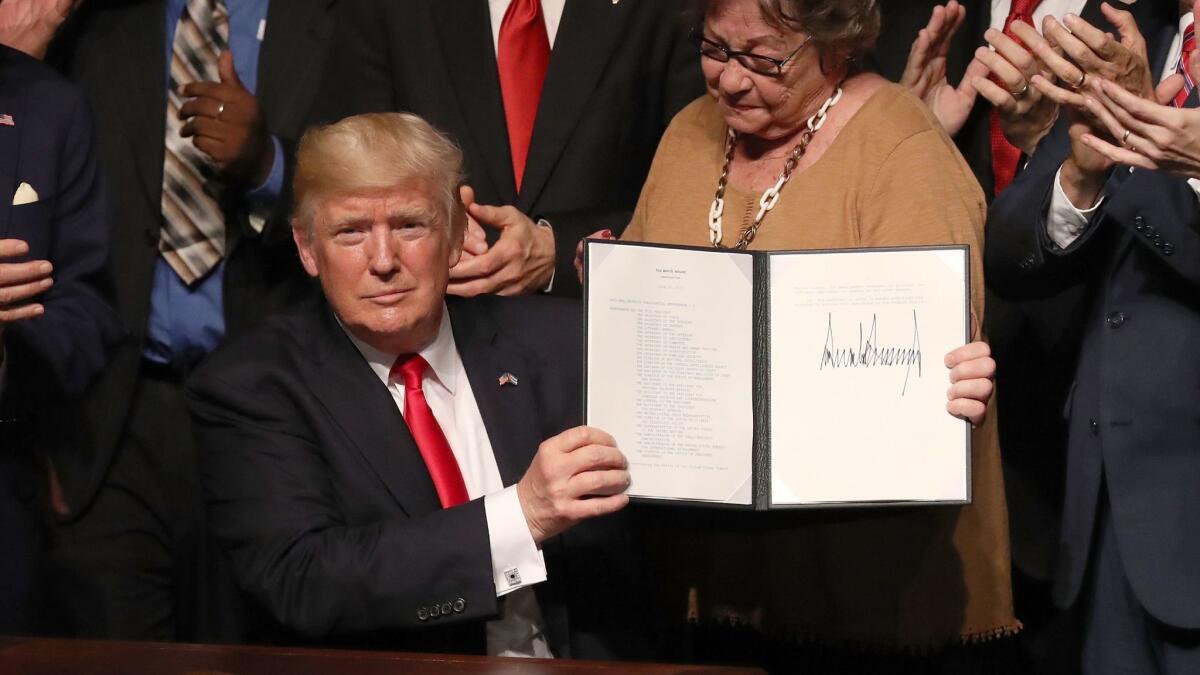Better ties between the U.S. and Cuba? Miami’s Cubans are divided

- Share via
Reporting from MIAMI — When President Trump scaled back President Obama’s pact that broadened relations with Cuba, he said he was “completely canceling” a “terrible and misguided deal.”
There was a time in Florida when the Cuban American community would have reacted to such an announcement with almost uniform approval.
But a paradigm shift has occurred over the last 20 years. Younger generations of Cuban Americans have been looking for opportunities to capitalize on trade and business with Cuba. According to a 2016 poll by Florida International University’s Cuban Research Institute, a majority of Cuban Americans oppose the U.S. embargo on the island and want better relations.
Not surprisingly, Trump’s announcement, made in Miami’s Little Havana, left some cheering but many in the business community disappointed.
Vicente Amor, vice president of ASC International USA, a Florida-based commercial travel agency specializing in executive-service trips to Cuba, said that aside from the drop in business expected from the Trump doctrine on Cuba, the president’s action signaled another issue.
“The problem is not only the impact of the changes,” he said. When the Obama administration forged the pact to improve U.S.-Cuban relations, the work was done without input from U.S. Sen. Marco Rubio of Florida and what Amor called “the Miami extremists.” This time, he said, they were “at the center of the deal,” along with the Treasury Department’s Office of Foreign Assets Control. For Amor, that’s a bad development.
Contrary to Trump’s sweeping statements, he did not completely gut the Obama administration agreement. However, it will affect a large community of entrepreneurs — both in the U.S. and in Cuba — that had been at the forefront of establishing economic ties between the two nations, according to the Washington, D.C.-based group, Engage Cuba, a coalition of pro-Cuban business companies that includes P&G, Viacom, Honeywell and Choice Hotels.
“We are encouraged that the Trump administration wants to help Cuba’s private sector, but unfortunately, the people who will be most negatively impacted by this directive are Cuban entrepreneurs,” Madeleine Russak, spokeswoman for Engage Cuba, said Saturday.
“The confusion that will surround this policy will undoubtedly stifle U.S. demand to travel to the island,” she said. “Additionally, by requiring Americans to travel in tour groups, the administration is not only making it more expensive for everyday Americans to travel to the island, but it pushes them away from staying in private homes, which are unable to accommodate large tour groups, and into state run hotels.”
Albert Fox, a Cuban American from Tampa, which has a generations-old Cuban community descended from the war for independence at the turn of the last century, said that although commercial flights might continue under the new policy, Trump’s decision will hurt American and foreign businesses.
“Overnight he’s eliminating hundreds and hundreds of people that were going there on a daily basis,” said Fox, who serves as president of the Tampa-based Alliance for Responsible Cuba Policy Foundation. “Do you think Southwest could cancel flights eventually for a lack of passengers?”
On Saturday, Southwest Airlines responded to that very question.
“Southwest is now reviewing the president’s statements made in South Florida and is assessing [the] impact any proposed changes could have on our current scheduled service to Cuba,” airline spokesman Dan Landson said by email Saturday.
Amor, the travel industry executive, said the trade embargo is patronizing.
“I don’t like President Trump’s policy,” he said. “It treats Cuba like a colony and fails to recognize Cuba as a sovereign nation.”
Trump had pledged during the presidential campaign to roll back Obama’s Cuban initiative, and Rubio had lobbied Trump intensely to keep that promise. Among other things, the new rules prohibit Americans from spending money on businesses controlled by the military.
“Economic practices that benefit the Cuban military at the expense of the Cuban people will soon be coming to an end #BetterDealforCuba,” Rubio tweeted.
But in the Cuban community, the pact drew diverse opinions from Republican lawmakers, including Sen. Jeff Flake of Arizona. On Saturday he tweeted, “Whatever the intent, new Cuba regs help Cuban Govt and hurt Cuban entrepreneurs.”
A day earlier, he suggested on Twitter that the Senate weigh in on U.S.-Cuba ties: “There is overwhelming support in the US Senate to allow all Americans the freedom to travel to Cuba. Let’s vote!”
Despite the generation shift, many in Florida’s Cuban American community resist any engagement with the Cuban communist government.
“The Obama administration’s policy towards Cuba consisted of a slew of unconditional and unilateral concessions that placed business interests over human rights and democracy,” said Orlando Gutierrez-Boronat, co-founder and spokesman for the Cuban Democratic Directorate, a Miami-based “resistance” group to the Castro government. “These unilateral concessions to the Castro regime actually emboldened them to increase their repression against the Cuban people. ... Only [the] rule of law in Cuba would guarantee American investment and protect the Cuban people.”
Neuhaus is a special correspondent.
ALSO
Nevada governor vetoes Medicaid-for-all bill
Protests erupt after Minnesota police officer is acquitted in shooting death of Philando Castile
More to Read
Sign up for Essential California
The most important California stories and recommendations in your inbox every morning.
You may occasionally receive promotional content from the Los Angeles Times.













